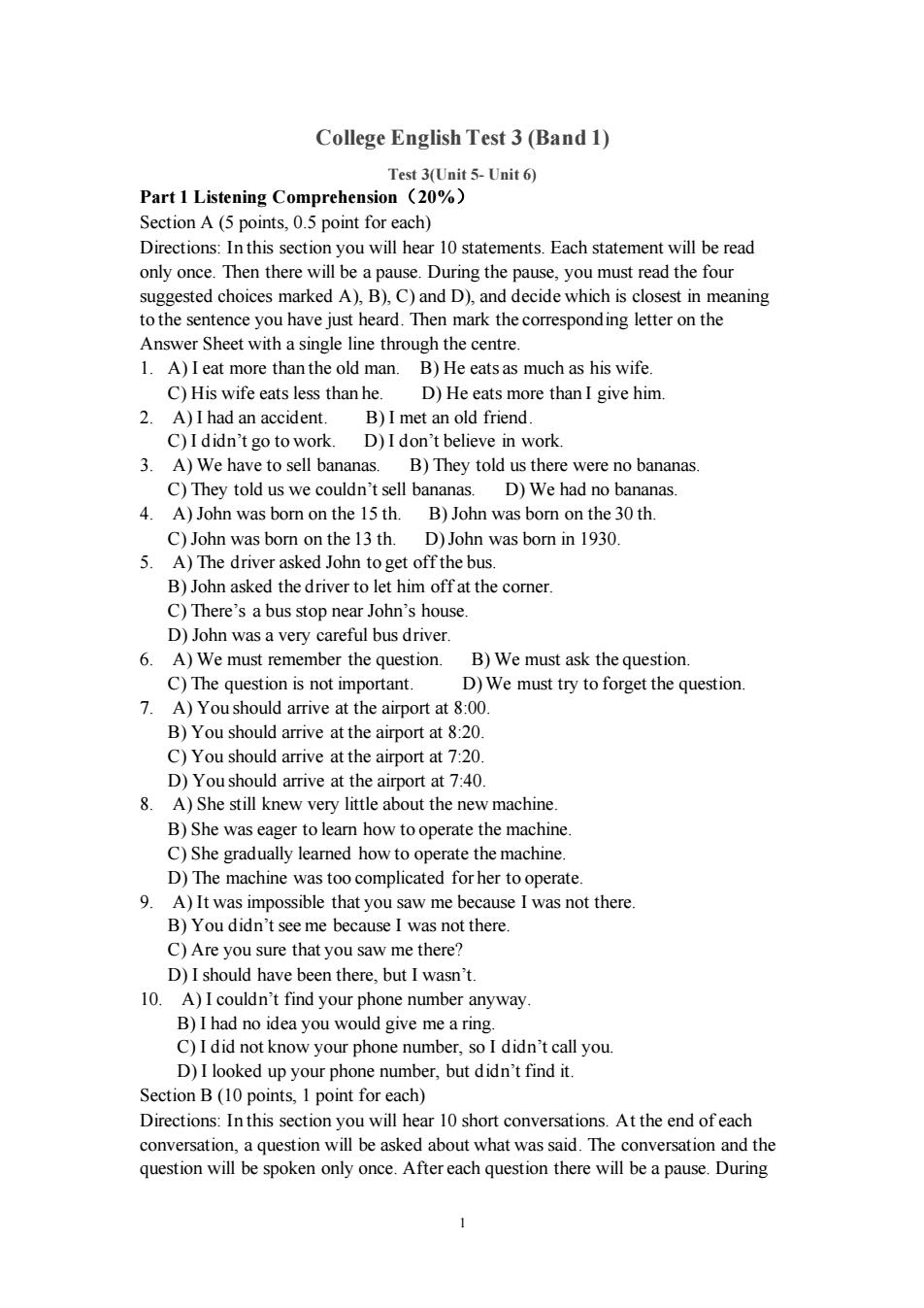
College English Test 3(Band 1) Test 3(Unit 5-Unit6) Part 1 Listening Comprehension (20%) Section a (5 points o 5 point for each) Directions:Inthis section you will hear 10 statements.Each statement will be read only once.Then there a pa use.During the p st read the fou suggested choices marked A),B).C)and D),and decide which is closest in meanin to the sentence you have just heard.Then mark the correspond ing letter on the Answer Sheet with a single line through the centre. 1.A)I eat more than the old man B)He eatsas much as his wife. C)His wife eats less thanhe D)Heeats more thanIgive him 2. A)Ihad an acciden B)I met an old frienc C)I didn't go to work. D)I don't believe in work 3.A)We have to sell bananas. B)They told us there were no bananas C)They told us we couldn't sell bananas.D)We had no bananas. 4.A)John was born on the 15 th.B)John was born on the 30 th. C)John was bom o n the 13 th D)John was bomn in 1930 5. A)The driver asked John toget off the bus. B)John asked the driver to let him offat the comner C)There's a bus stop near John's house. d)John was a very careful bus driver 6. A)We must ret mber the question B)We must ask the questior C)The questic on is not important D)We must try to forget the question. 7.A)You should arrive at the airport at 8:00. B)You should arrive at the airport at 8:20. C)You should arrive at the airport at 7:20 D)Youshould arrive at the airport at 7:40 8. A)She still knew very little about the new machine B)She was eager to learn how to operate the machine C)She gradually learned how to operate the machine. D)The machine was too complicated for her to operate A)It was impossible that you saw me because I was not there B)You didn't see me be se i wa not ther C)Are you sure that you saw me there? D)I should have been there.but I wasn't 10.A)I couldn't find your phone number anyway B)I had no idea you would give me a ring. C)Idid not kn umber.so I didn't call you D)I looked up your phone nur mber,but t didn't fin d Section B(10 points,I point for each) Directions:In this section you will hear 10 short conversations.At the end of each conversation,a question will be asked about what was said.The conversation and the question will be spoken only once.Aftereach question there will be a pause.During
1 College English Test 3 (Band 1) Test 3(Unit 5- Unit 6) Part 1 Listening Comprehension(20%) Section A (5 points, 0.5 point for each) Directions: In this section you will hear 10 statements. Each statement will be read only once. Then there will be a pause. During the pause, you must read the four suggested choices marked A), B), C) and D), and decide which is closest in meaning to the sentence you have just heard. Then mark the corresponding letter on the Answer Sheet with a single line through the centre. 1. A) I eat more than the old man. B) He eats as much as his wife. C) His wife eats less than he. D) He eats more than I give him. 2. A) I had an accident. B) I met an old friend. C) I didn’t go to work. D) I don’t believe in work. 3. A) We have to sell bananas. B) They told us there were no bananas. C) They told us we couldn’t sell bananas. D) We had no bananas. 4. A) John was born on the 15 th. B) John was born on the 30 th. C) John was born on the 13 th. D) John was born in 1930. 5. A) The driver asked John to get off the bus. B) John asked the driver to let him off at the corner. C) There’s a bus stop near John’s house. D) John was a very careful bus driver. 6. A) We must remember the question. B) We must ask the question. C) The question is not important. D) We must try to forget the question. 7. A) You should arrive at the airport at 8:00. B) You should arrive at the airport at 8:20. C) You should arrive at the airport at 7:20. D) You should arrive at the airport at 7:40. 8. A) She still knew very little about the new machine. B) She was eager to learn how to operate the machine. C) She gradually learned how to operate the machine. D) The machine was too complicated for her to operate. 9. A) It was impossible that you saw me because I was not there. B) You didn’t see me because I was not there. C) Are you sure that you saw me there? D) I should have been there, but I wasn’t. 10. A) I couldn’t find your phone number anyway. B) I had no idea you would give me a ring. C) I did not know your phone number, so I didn’t call you. D) I looked up your phone number, but didn’t find it. Section B (10 points, 1 point for each) Directions: In this section you will hear 10 short conversations. At the end of each conversation, a question will be asked about what was said. The conversation and the question will be spoken only once. After each question there will be a pause. During
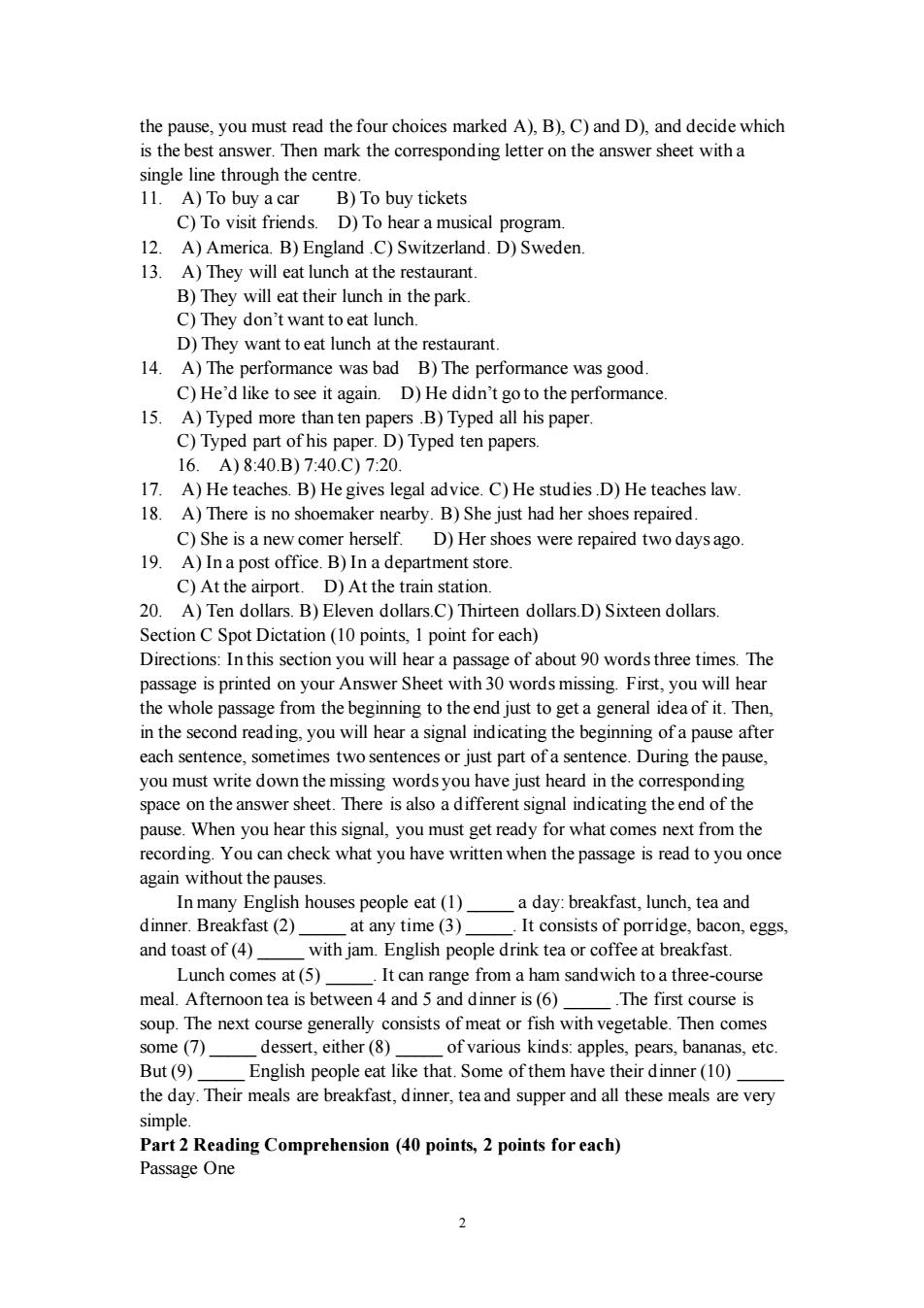
the pause you must read the four choices marked a)b)c)and d)and decide which is the best swer. Then mi ark the corresponding letter on the answer sheet witha through the 11.A)To buy acar B)To buy tickets C)To visit friends.D)To hear a musical program 12.A)America.B)England.C)Switzerland.D)Sweden. 13 A)They will eat lur nch at the restau will eat their lur the parl C)They don't want to eat lunch D)They want to eat lunch at the restaurant 14.A)The performance was bad B)The performance was good. C)He'd like to see it again.D)He didn't goto the performance 15 than ten pap .B)Typed all his pape D)Typed ten papers. 16. A)8:40.B)740.C)7:20 17. A)He teaches.B)He gives legal advice.C)He studies.D)He teaches law. 18 A)There is no shoemaker nearby.B)She just had her shoes repaired. C)She is a ne mer herself. D)Her shoes were repaired two daysag 19. A)Inapost office.B)Ina department store C)At the airport. D)At the train station. 20.A)Ten dollars.B)Eleven dollars C)Thirteen dollars D)Sixteen dollars Section C Spot Dictation(10 points,1 point for each) Directions:In this section uwill hear a passage of about 90words three times.The passage is printe on you nswer Sheet th30 words missing First,you ill hea the whole passage from the beginning to the end just to get a general idea of it.Then in the second reading,you will hear a signal indicating the beginning of a pause after each sentence,sometimes two sentences or just part of a sentence.During the pause, you must write down the missing wordsyou have just heard in the corresponding sheet There e is also adiffer nal indicating the nd of the pause.When you hear this signal,you must get ready for what comes next from the recording.You can check what you have written when the passage is read to you once again without the pauses. In many english houses people eat(1) a day:breakfast.lunch.tea and dinner Breakfast (2) at any time (3) .It consists of porridge,bacon,eggs and toast of (4) ith jam.English people drink tea or coffee at breakfast Lunch comes at (5) It can range from a ham sandwich to a three-course meal.Afternoon tea is between 4 and 5 and dinner is (6) The first course is soup.The next course generally consists of meat or fish with vegetable.Then comes some (7) dessert,.either(⑧) of various kinds:apples,pears,bananas,etc But(9) English people at like that. f the their dinner (10) the day.Their meals are breal fast,dinner,teaand supper and all these meals are very simple. Part 2 Reading Comprehension(40 points,2 points for each) Passage One
2 the pause, you must read the four choices marked A), B), C) and D), and decide which is the best answer. Then mark the corresponding letter on the answer sheet with a single line through the centre. 11. A) To buy a car B) To buy tickets C) To visit friends. D) To hear a musical program. 12. A) America. B) England .C) Switzerland. D) Sweden. 13. A) They will eat lunch at the restaurant. B) They will eat their lunch in the park. C) They don’t want to eat lunch. D) They want to eat lunch at the restaurant. 14. A) The performance was bad B) The performance was good. C) He’d like to see it again. D) He didn’t go to the performance. 15. A) Typed more than ten papers .B) Typed all his paper. C) Typed part of his paper. D) Typed ten papers. 16. A) 8:40.B) 7:40.C) 7:20. 17. A) He teaches. B) He gives legal advice. C) He studies.D) He teaches law. 18. A) There is no shoemaker nearby. B) She just had her shoes repaired. C) She is a new comer herself. D) Her shoes were repaired two days ago. 19. A) In a post office. B) In a department store. C) At the airport. D) At the train station. 20. A) Ten dollars. B) Eleven dollars.C) Thirteen dollars.D) Sixteen dollars. Section C Spot Dictation (10 points, 1 point for each) Directions: In this section you will hear a passage of about 90 words three times. The passage is printed on your Answer Sheet with 30 words missing. First, you will hear the whole passage from the beginning to the end just to get a general idea of it. Then, in the second reading, you will hear a signal indicating the beginning of a pause after each sentence, sometimes two sentences or just part of a sentence. During the pause, you must write down the missing words you have just heard in the corresponding space on the answer sheet. There is also a different signal indicating the end of the pause. When you hear this signal, you must get ready for what comes next from the recording. You can check what you have written when the passage is read to you once again without the pauses. In many English houses people eat (1) _____ a day: breakfast, lunch, tea and dinner. Breakfast (2) _____ at any time (3) _____. It consists of porridge, bacon, eggs, and toast of (4) _____ with jam. English people drink tea or coffee at breakfast. Lunch comes at (5) _____. It can range from a ham sandwich to a three-course meal. Afternoon tea is between 4 and 5 and dinner is (6) _____ .The first course is soup. The next course generally consists of meat or fish with vegetable. Then comes some (7) _____ dessert, either (8) _____ of various kinds: apples, pears, bananas, etc. But (9) _____ English people eat like that. Some of them have their dinner (10) _____ the day. Their meals are breakfast, dinner, tea and supper and all these meals are very simple. Part 2 Reading Comprehension (40 points, 2 points for each) Passage One
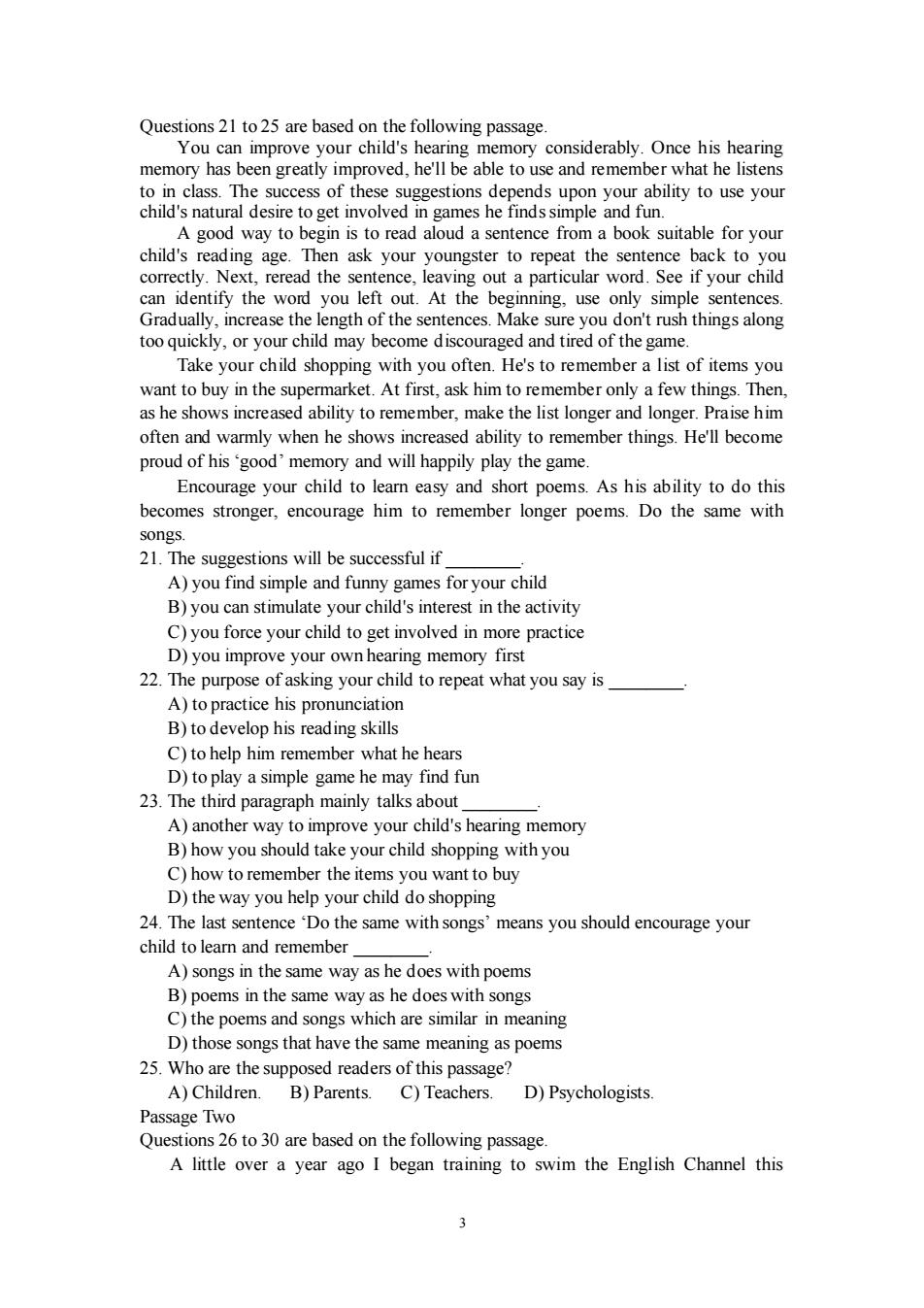
Questions21 to25 are based on the following pass You can improve your child's hearin mory considerably once his hearing memory has been greatly improved.he'll be able to use and remember what he listens to in class.The success of these suggestions depends upon your ability to use you child's natural desire to get involved in games he finds simple and fun. A good way to begin is to read aloud a sentence from a book suitable for your child's reading age.Then ask your youngster to repeat the sentence back to you correctly.Next,reread the sentence,leaving out a particular word.See if your child can identify the word you left out.At the beginning.use only simple sentences Gradually,increase the length of the sentences.Make sure you don't rush things along too quickly,or your child may become discouraged and tired of the game. Take your child shopping with you often.He's to remember a list of items vou want to buy in the supermarket.At first,ask him to remember only a few things.Then, as he shows increased ability to remember.make the list longer and longer.praise him often and warmly when he shows incr ased ability to rem ber things He'll become prou of his'good'memory and will happily play the game Encourage your child to learn easy and short poems.As his ability to do this becomes stronger,encourage him to remember longer poems.Do the same with 21.The suggestions will be successful if A)you find simple and funn es for your child C)you force your child to get involved in more practice D)vou improve vour own hearing memory first 22.The purpose of asking your child to repeat what you say is A)topractice his pro B)to develop his reading skills C)to help him remember what he hears D)to play a simple game he may find fun 23.The third paragraph mainly talks about A)another ur child's hearing memory how you sotaouhlhithyou C)how to remember the items you want to buy D)the way you help your child do shopping 24.The last sentence Do the same with songs'means you should encourage your child to lam and remember A)songs in the same way as he does with poems B)poems in the same way as he does with songs C)the poems and songs which are similar in meaning D)those songs that have the same meaning as poems 25 Who are the supposed readers of this passage? A)Children B)Parents C)Teachers D)Psychologists Passage Two Questions 26 to 30 are based on the following passage A little over a year ago I began training to swim the English Channel this
3 Questions 21 to 25 are based on the following passage. You can improve your child's hearing memory considerably. Once his hearing memory has been greatly improved, he'll be able to use and remember what he listens to in class. The success of these suggestions depends upon your ability to use your child's natural desire to get involved in games he finds simple and fun. A good way to begin is to read aloud a sentence from a book suitable for your child's reading age. Then ask your youngster to repeat the sentence back to you correctly. Next, reread the sentence, leaving out a particular word. See if your child can identify the word you left out. At the beginning, use only simple sentences. Gradually, increase the length of the sentences. Make sure you don't rush things along too quickly, or your child may become discouraged and tired of the game. Take your child shopping with you often. He's to remember a list of items you want to buy in the supermarket. At first, ask him to remember only a few things. Then, as he shows increased ability to remember, make the list longer and longer. Praise him often and warmly when he shows increased ability to remember things. He'll become proud of his ‘good’ memory and will happily play the game. Encourage your child to learn easy and short poems. As his ability to do this becomes stronger, encourage him to remember longer poems. Do the same with songs. 21. The suggestions will be successful if ________. A) you find simple and funny games for your child B) you can stimulate your child's interest in the activity C) you force your child to get involved in more practice D) you improve your own hearing memory first 22. The purpose of asking your child to repeat what you say is ________. A) to practice his pronunciation B) to develop his reading skills C) to help him remember what he hears D) to play a simple game he may find fun 23. The third paragraph mainly talks about ________. A) another way to improve your child's hearing memory B) how you should take your child shopping with you C) how to remember the items you want to buy D) the way you help your child do shopping 24. The last sentence ‘Do the same with songs’ means you should encourage your child to learn and remember ________. A) songs in the same way as he does with poems B) poems in the same way as he does with songs C) the poems and songs which are similar in meaning D) those songs that have the same meaning as poems 25. Who are the supposed readers of this passage? A) Children. B) Parents. C) Teachers. D) Psychologists. Passage Two Questions 26 to 30 are based on the following passage. A little over a year ago I began training to swim the English Channel this
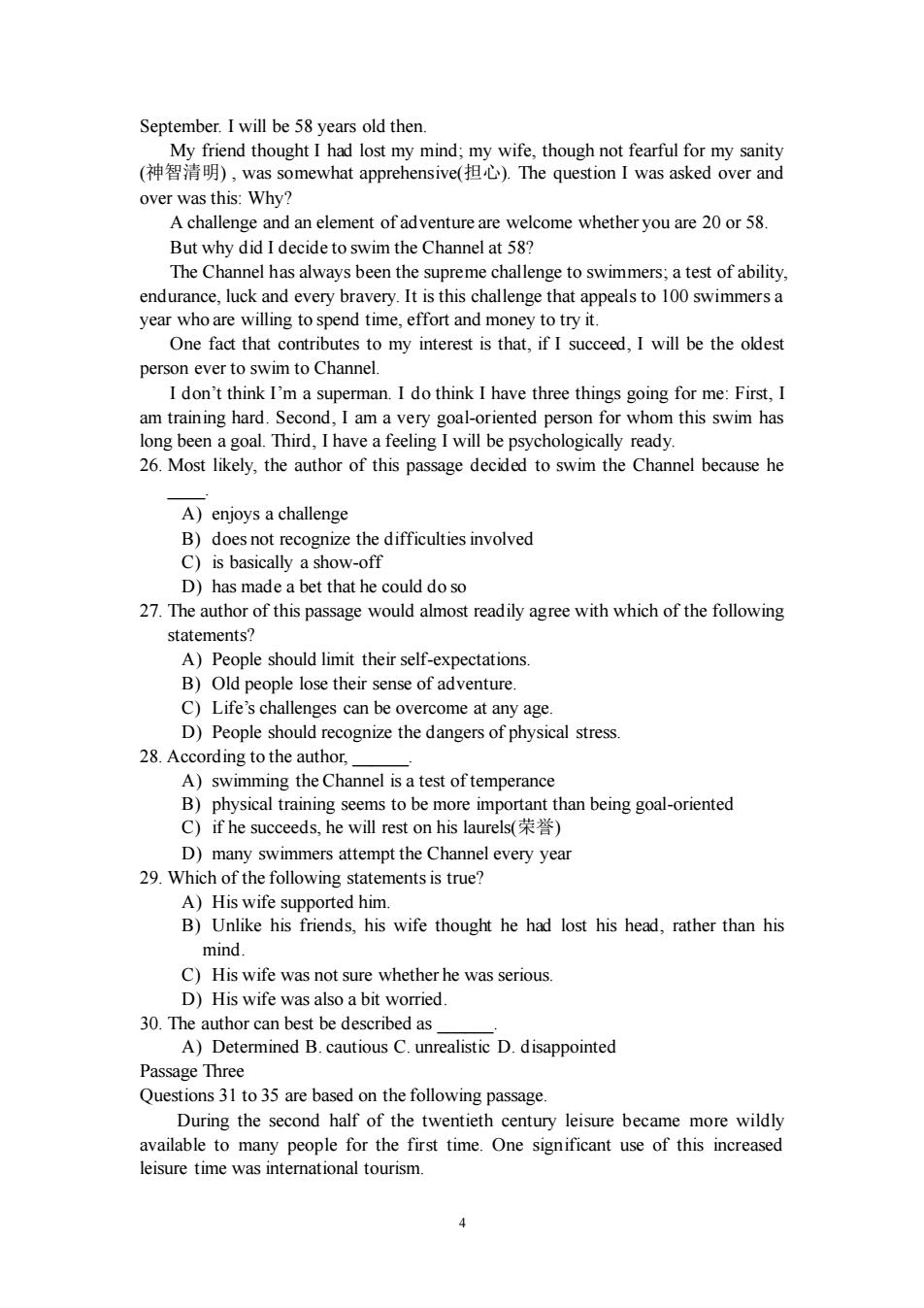
September i will be 58 vears old then My friend tho (神智清明) my mind: over was this:Why? A challenge and an element of ad venture are welcome whether you are 20 or 58. But why did I decide to swim the Channel at 58? The Channel has always sbeen the supreme challeng to swimmers:a test of ability year whoare willing to spend time,effort and money to try it. One fact that contributes to my interest is that.if I succeed.I will be the oldest person ever to swim to channel I don't think I'm a superman.I do think I have three things going for me:First,I am training hard.Se r wh n this swim has long been a goal 26.Most likely,the author of this passage decided to swim the Channel because he A)enjoys a challenge not D)has made a bet that he could do so 27.The author of this passage would almost readily agree with which of the following statements? A)People should limit their self-expectations B)Old people lose their sense of adventure C)Life's challenges can be overcome at any age. D)People should recognize the dangers of physical stress. 28.According to the author, A)swimming the Channel is a test oftemperance B)physical tra tant than being goal-oriented D)many swimmers attempt the Channel every year 29.Which of the following statements is true? A)His wife supported him B)Unlike his friends,his wife thought he had lost his head,rather than his mind C)His wife was not sure whether he was serious. d)His wife was also a bit worried. 30.The author can best be described as A)Determined B.cautious C.unrealistic D.disappointed Passage Thre Questions31 to35 are based on the following passage. During the second half of the twentieth century leisure became more wildly available to many people for the first time.One significant use of this increased leisure time was international tourism. 4
4 September. I will be 58 years old then. My friend thought I had lost my mind; my wife, though not fearful for my sanity (神智清明) , was somewhat apprehensive(担心). The question I was asked over and over was this: Why? A challenge and an element of adventure are welcome whether you are 20 or 58. But why did I decide to swim the Channel at 58? The Channel has always been the supreme challenge to swimmers; a test of ability, endurance, luck and every bravery. It is this challenge that appeals to 100 swimmers a year who are willing to spend time, effort and money to try it. One fact that contributes to my interest is that, if I succeed, I will be the oldest person ever to swim to Channel. I don’t think I’m a superman. I do think I have three things going for me: First, I am training hard. Second, I am a very goal-oriented person for whom this swim has long been a goal. Third, I have a feeling I will be psychologically ready. 26. Most likely, the author of this passage decided to swim the Channel because he ____. A) enjoys a challenge B) does not recognize the difficulties involved C) is basically a show-off D) has made a bet that he could do so 27. The author of this passage would almost readily agree with which of the following statements? A) People should limit their self-expectations. B) Old people lose their sense of adventure. C) Life’s challenges can be overcome at any age. D) People should recognize the dangers of physical stress. 28. According to the author, ______. A) swimming the Channel is a test of temperance B) physical training seems to be more important than being goal-oriented C) if he succeeds, he will rest on his laurels(荣誉) D) many swimmers attempt the Channel every year 29. Which of the following statements is true? A) His wife supported him. B) Unlike his friends, his wife thought he had lost his head, rather than his mind. C) His wife was not sure whether he was serious. D) His wife was also a bit worried. 30. The author can best be described as ______. A) Determined B. cautious C. unrealistic D. disappointed Passage Three Questions 31 to 35 are based on the following passage. During the second half of the twentieth century leisure became more wildly available to many people for the first time. One significant use of this increased leisure time was international tourism
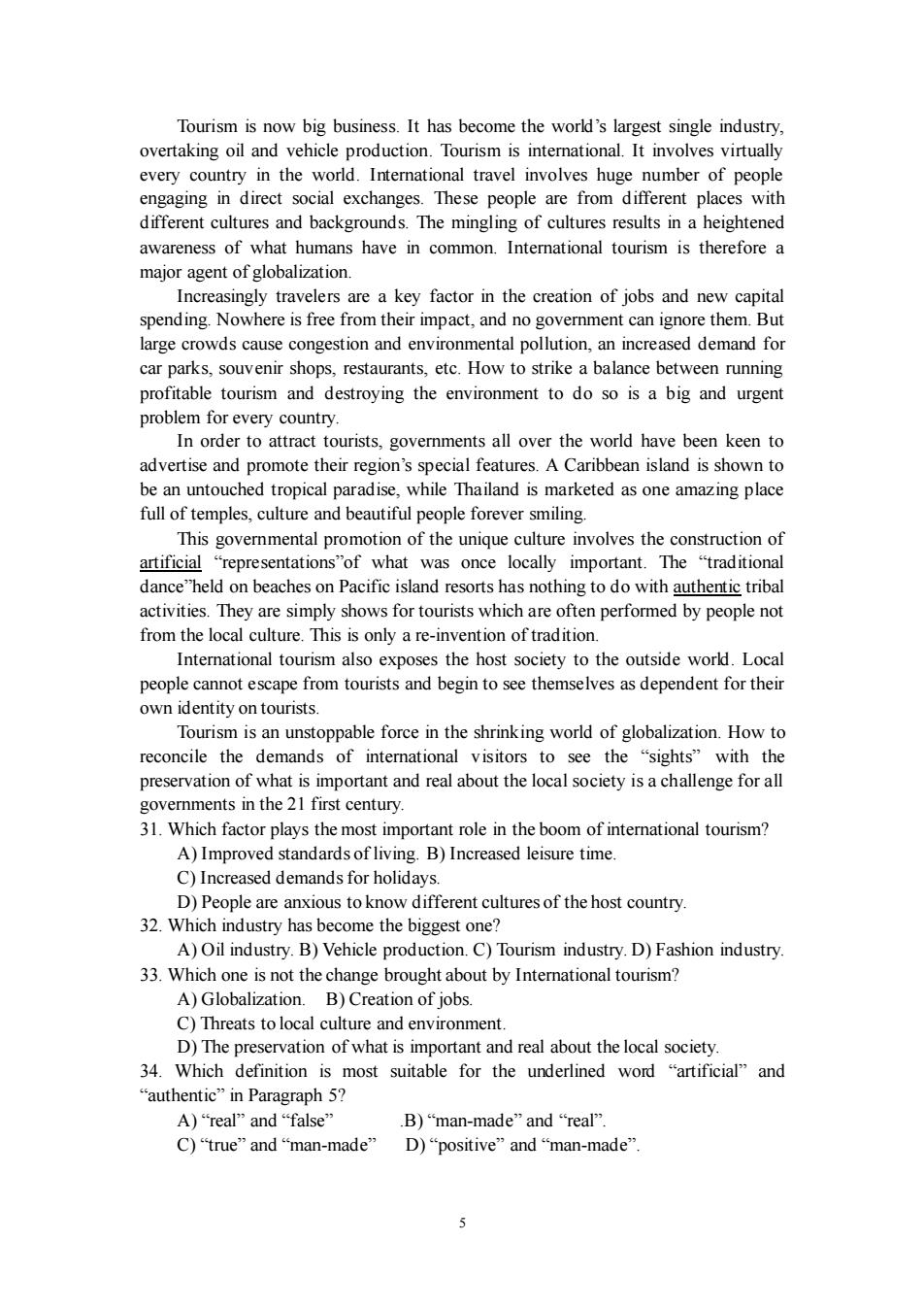
Tourism is now big business.It has become the world's largest single industry overtaking oil and Tourism is intemational.It involves virtuall every country in the world.Intemational travel involves huge number of people engaging in direct social exchanges.These people are from different places with different cultures and backgrounds.The mingling of cultures results in a heightened awareness of what humans have in common.International tourism is therefore a major agent of globalization Increasingly travelers are a key factor in the creation of jobs and new capital spending.Nowhere is free from their impact,and no government can ignore them.But large crowds cause congestion and environmental pollution,an increased demand for car parks.souvenir shops.restaurants.etc.How to strike a balance between running profitable tourism and destroying the environment to do so is a big and urgen problem for every country. In order to attract tourists,governments all over the world have been keen to advertise and promote their region's special features.A Caribbean island is shown to be an untouched tropical paradise,while Thailand is marketed as one amazing place full of temples,culture and beautiful people forever smiling. promotion of the unique ure involves the construc tion of artificial "representations"of what was once locally important The“traditiona dance"held on beaches on Pacific island resorts has nothing to do with authentic tribal activities.They are simply shows for tourists which are often performed by people not from the local culture This is only a re-invention of tradition tional to rism also the hos ety to the outside world.Local people cannot escape from tourists and begin to see themselves as dependent for their own identity on tourists. Tourism is an unstoppable force in the shrinking world of globalization.How to reconcile the demands of international visitors to see the "sights"with the reservation of what is important and real about the local society is a challenge for all ents in the 21 first century 31.Which factor plays the most important role in the boom of international tourism? A)Improved standards of living.B)Increased leisure time. C)Increased demands for holidays D)People are anxious to know different cultures of the host country 32.Which ind has he e the his A)Oil industry.B)Vehicle production.C)Tourism industry.D)Fashion industry. 33.Which one is not the change brought about by Intemational tourism? A)Globalization B)Creation of iobs C)Threats to local culture and environment D)The ration of what is ortant and real about the local society 34.Which definitior is most suitab underlined "artificial"and authentic"in Paragraph 5. A)"real”and“false B)“man-made”and“real C)"true”and“man-made" D)“positive”and“man-made 5
5 Tourism is now big business. It has become the world’s largest single industry, overtaking oil and vehicle production. Tourism is international. It involves virtually every country in the world. International travel involves huge number of people engaging in direct social exchanges. These people are from different places with different cultures and backgrounds. The mingling of cultures results in a heightened awareness of what humans have in common. International tourism is therefore a major agent of globalization. Increasingly travelers are a key factor in the creation of jobs and new capital spending. Nowhere is free from their impact, and no government can ignore them. But large crowds cause congestion and environmental pollution, an increased demand for car parks, souvenir shops, restaurants, etc. How to strike a balance between running profitable tourism and destroying the environment to do so is a big and urgent problem for every country. In order to attract tourists, governments all over the world have been keen to advertise and promote their region’s special features. A Caribbean island is shown to be an untouched tropical paradise, while Thailand is marketed as one amazing place full of temples, culture and beautiful people forever smiling. This governmental promotion of the unique culture involves the construction of artificial “representations”of what was once locally important. The “traditional dance”held on beaches on Pacific island resorts has nothing to do with authentic tribal activities. They are simply shows for tourists which are often performed by people not from the local culture. This is only a re-invention of tradition. International tourism also exposes the host society to the outside world. Local people cannot escape from tourists and begin to see themselves as dependent for their own identity on tourists. Tourism is an unstoppable force in the shrinking world of globalization. How to reconcile the demands of international visitors to see the “sights” with the preservation of what is important and real about the local society is a challenge for all governments in the 21 first century. 31. Which factor plays the most important role in the boom of international tourism? A) Improved standards of living. B) Increased leisure time. C) Increased demands for holidays. D) People are anxious to know different cultures of the host country. 32. Which industry has become the biggest one? A) Oil industry. B) Vehicle production. C) Tourism industry. D) Fashion industry. 33. Which one is not the change brought about by International tourism? A) Globalization. B) Creation of jobs. C) Threats to local culture and environment. D) The preservation of what is important and real about the local society. 34. Which definition is most suitable for the underlined word “artificial” and “authentic” in Paragraph 5? A) “real” and “false” .B) “man-made” and “real”. C) “true” and “man-made” D) “positive” and “man-made